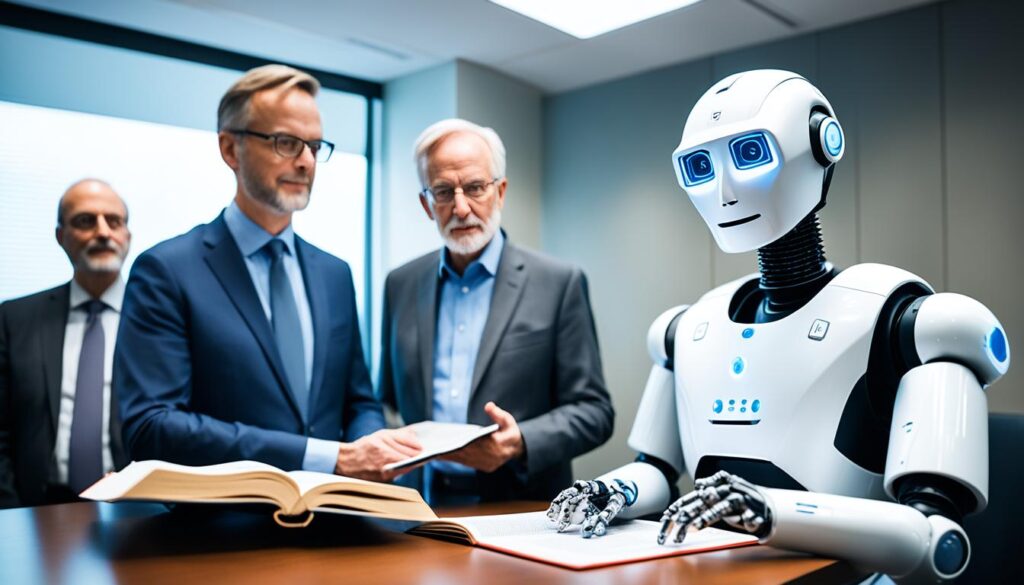“As an Amazon Associate I earn from qualifying purchases.” .
Imagine a Sunday morning at Saint Paul’s Church in Fort Bavaria, Germany. Here, the ancient echoes of prayers mix with the sound of technological innovation. Over 300 believers experienced the first AI-powered sermon, marking a big step in religious gatherings. This combo of faith and digital progress creates a new, inspiring way to worship.
The use of AI in sermons is changing old methods and making theological talks more accessible. This brave move by the German church shows how tech can fit perfectly into our spiritual lives. It leads us into an era of AI-powered sermons that speak to modern believers.
Key Takeaways
- Innovative AI sermons are boosting spiritual involvement.
- Technology links traditional beliefs with the needs of today’s followers.
- German church AI sermon shows a fresh way to worship.
- AI allows deeper and easier access to theology.
- AI in religion brings both excitement and discussions on ethics.
This groundbreaking method refreshes the spiritual vibe and makes us think deeply about religion and tech’s future together. As we dive more into this blend, it’s clear. Thought-provoking sermons by AI might lead the way in faith practices, reaching more people in meaningful ways.
A Historical Moment: AI Delivers a Sermon in German Church
At St. Paul’s Church in Fuerth, Bavaria, an event shocked many. Over 300 people saw the first AI sermon in a German church. This marked a huge shift from what’s usual. It happened during the Deutscher Evangelischer Kirchentag. This event draws lots of people every two years. Remarkably, AI technology, like ChatGPT from OpenAI, created about 98% of this service. This included prayers and music.
Breaking Traditions: The First AI-Powered Sermon
AI’s role in religious services shows how traditions are changing. This shift brings up many talks about technology’s role in faith. It questions how we express our beliefs. The AI sermon was a big step. It showed tech’s power to change how we worship. Many see this as a way to make religious services more diverse.
Reactions and Reflections from the Congregation
People had mixed feelings but found it interesting. The novel approach drew a crowd. Many came early, causing a line outside an hour before starting. People shared different views. They wondered about tech’s place in church. Some were amazed, while others were worried about keeping church sacred.
Considering the Emotional Depth in AI Sermons
The biggest talk was if AI can match a human’s emotional touch in sermons. Some doubted an AI could show true feelings like a person does. However, others saw potential. They felt the AI brought a new kind of inspiration. This opens doors on how we share religious messages.
| Event Component | Percentage AI-Generated | Attendee Count |
|---|---|---|
| Sermon, Prayers, Music | 98% | Over 300 |
| Overall Church Service | 98% | Long queue observed |
Looking into AI in places like church makes us think more. It’s not just about using new tech. It’s also about keeping our traditions and feelings alive. This topic invites everyone to talk about what’s really important in our spiritual lives.
German Church AI Sermon: Bridging Technology and Faith
A German church has embarked on an exciting journey by incorporating AI into its worship services. This innovative move combines technology and faith to create a new kind of spiritual experience. It involves a partnership between ChatGPT and Jonas Simmerlein, introducing a 40-minute German church AI sermon as a technological milestone in religious practices.
At a service in Bavaria, over 300 attendees witnessed this unique integration of technology and faith. An avatar of ChatGPT led the service, showing how traditions and modern tech can merge. It was a meaningful step towards bridging the gap between classic beliefs and current innovations.
Attendees had varied reactions to the AI-led sermon. Some were concerned about missing emotional depth, while others found the approach fresh and inclusive. Anna Puzio, a tech ethics researcher, highlighted AI’s role in making religious services more accessible to everyone.
| Feedback Participant | Viewpoint | Impact on Faith Perception |
|---|---|---|
| General Attendee | Lacks emotion and spirituality | Negative |
| Lutheran Pastor | Effectively delivered sermon | Positive |
| Anna Puzio | Increases accessibility | Positive |
Jonas Simmerlein sees AI as a tool to support, not replace, religious leaders. It could help with sermon prep and pastoral care. This shows an evolving relationship between technology and faith, enriching spiritual guidance.

Exploring the potential of AI in sermons highlights the evolving role of AI in religion. This integration can draw in younger audiences, making faith more appealing in the digital age.
This Bavarian church’s approach marks a key step in bridging the gap between old beliefs and new tech. We’re just starting to see how faith and technology can come together. The future holds exciting possibilities for more inclusive and engaging religious practices.
AI and the Future of Religious Texts
Technology is becoming more intertwined with society every day, touching even the spiritual realms. It brings new chances and big debates. The idea of an AI-generated Bible shows this well. It seeks to make biblical teachings understandable worldwide, appealing to today’s people.
The Proposal for an AI-Generated ‘Globalized New Bible’
The goal of an AI-generated Bible is to bring together different cultural and language interpretations into one. This version would be easy for everyone to use, hoping to unite various religious groups. AI and religion experts are working together. They use machine learning to summarize lots of theological information into a clear, culturally sensitive text.
Controversies Arising from AI Intervention in Scripture
However, using tech to update scripture is causing a stir. Some say it messes with the texts’ sacred aspects. They fear AI can’t grasp the deep meaning like humans or religious leaders can. This issue is sparking a lot of ethical debates in the digital era.
Recent discussions show a key moment for religious practices, mixing tradition and tech. It’s a time full of doubts and hope.
| Feature | Specification |
|---|---|
| Maximum Notification Count | 6 |
| Badge Display Notifications | 5 |
| Notification Timeout | 1500 units |
| System Personalization Capability | Enabled |
| Performance Measurement | Internal user tracking metric |
This analysis shows more than just what the German Church’s AI can do. It hints at how AI could make religious texts more accessible to different people worldwide. It could improve how we understand these important writings.
Understanding the Impact of Machine Learning on Sermon Creation
Machine learning is changing how sermons are made. It brings new ways to craft sermons, making them more insightful. Tools like the Universal Sentence Encoder help make sermons differently, adding value that wasn’t there before.
Pastors use machine learning to improve their sermons and connect better with people. This tech can look at lots of information and find trends. This leads to sermons that touch people’s hearts more personally.
- Transcription and Content Organization: The Universal Sentence Encoder quickly turns spoken words into text. It keeps the speaker’s original meaning. The text then gets analyzed to arrange themes in a clear way, making the main points stand out.
- Content Refinement: Machine learning helps edit sermons by pointing out repeats and suggesting new ways to say things. This makes the sermon smoother.
- Summary Creation: It can also make short summaries of sermons. This makes it easy to share the main ideas through newsletters or online.
Using machine learning in sermons means knowing a bit about tech like Python. But, the benefits like better sermon delivery make it worth learning for many leaders.
| Feature | Benefits |
|---|---|
| Automated Transcription | Turns speech to text quickly, keeping it real and authentic. |
| Theme Identification | Makes sermons well-organized, better flow, and easier to understand. |
| Content Editing | Cuts down on repeats, making the sermon clearer and more engaging. |
| Summary Generation | Summarizes sermons briefly for easy sharing and promotion. |
The impact of AI on preaching includes its growing acceptance. More people are interested in tech in religious spaces. Online discussions and social media for religious leaders talk about using AI well.

Embracing this tech helps leaders create better sermons and build a more informed community. As machine learning grows, it could change how we think about sermons and spirituality, bringing them together beautifully.
The Ethical Dimensions of AI in Religious Practices
Artificial intelligence (AI) is entering religious areas, raising ethical issues. It’s hard to balance tradition with tech’s new role in faith. As AI becomes part of religion, ethical questions get more complex. This is especially true when AI meets old religious beliefs and teachings.

Navigating the Line Between Innovation and Tradition
Using AI in faith is tricky. Some see it as straying from old ways. Others think it makes faith more open and engaging.
A service in Bavaria with AI showed people are curious and open to change. Over 300 came, showing interest in tech. Still, it’s key to keep the heart of traditional faith while exploring new ideas.
Potential Influences of AI on Theological Interpretation
AI could change how we see sacred texts. It can sort through lots of information, offering fresh views on old teachings. But, using AI in faith sparks debate about if it can truly understand deep religious meanings.
Ethics must lead when we bring AI into religion. This will keep teachings true to their roots. Thoughts from theologians stress that AI should aid, not replace, human spiritual leaders.
The AI service in Bavaria showed both potential and limits of tech in faith. It lacked the emotional connection that comes from human leaders.
In the end, AI’s role in religion demands careful thought and talks. We need a team effort from tech experts, faith leaders, and scholars. They must work together to make sure AI helps without harming religious values and traditions.
Conclusion
The integration of AI in religion brings a mix of old and new. At a German church, a sermon was held using AI, which was a big deal. Theologians like Jonas Simmerlein have started to use tools like ChatGPT at events like the Deutscher Evangelischer Kirchentag. This change shows us a new way to create and share religious messages. The AI sermon touched on deep Christian themes like faith and redemption. People’s reactions were mixed. Some really liked it, while others were worried about what it means for the future.
The way we see faith and technology together is at a turning point. The introduction of AI into religious services, like in the Protestant church in Germany, shakes up old ways of doing things. It makes church leaders and followers think about what digital tech means for their spiritual lives. While some people are unsure and fear losing a personal touch in religion, others find the new approach refreshing and meaningful.
Looking ahead, AI in religion might become more usual. The key issue now is how to blend technology with keeping religious practices sacred. The use of AI could open new doors for religion, making spiritual experiences richer. By mixing AI with religious activities, we could see big changes in worship, how people come together, and how teachings are shared. It looks like an exciting future for both technology and religion.
FAQ
How has a German church embraced artificial intelligence (AI) for sermons?
What is the significance of an AI-powered sermon being delivered in a German church?
How did the congregation react to the AI-powered sermon?
How is emotional depth considered in AI sermons?
What benefits are there in incorporating AI technology in religious practices?
Is there a proposal for an AI-generated religious text?
What controversies arise from AI intervention in religious scripture?
How do machine learning algorithms impact sermon creation?
What are the ethical considerations surrounding the use of AI in religious practices?
What is the future outlook for the relationship between AI and religion?
Source Links
- https://www.toolify.ai/ai-news/groundbreaking-ai-chatbot-preaches-to-hundreds-in-german-church-1819792
- https://www.worldreligionnews.com/religion-news/artificial-intelligence/
- https://www.news10.com/news/technology/can-a-chatbot-preach-a-good-sermon-hundreds-attend-experimental-lutheran-church-service-to-find-out/
- https://finance.yahoo.com/news/ai-reverends-leads-church-congregation-000652530.html
- https://www.linkedin.com/pulse/leveraging-universal-sentence-encoder-transform-sermons-kevin-chege
- https://outreachmagazine.com/features/78402-ai-and-the-church-a-brave-new-world.html
- https://freshexpressions.com/2023/07/17/ai-5-things-church-leaders-need-to-understand-about-the-ultimate-disruptor
- https://apnews.com/article/germany-church-protestants-chatgpt-ai-sermon-651f21c24cfb47e3122e987a7263d348
- https://think.taylorandfrancis.com/special_issues/artificial-intelligence-theological-perspective/
- https://www.usnews.com/news/world/articles/2023-06-10/can-a-chatbot-preach-a-good-sermon-hundreds-attend-experimental-lutheran-church-service-to-find-out
- https://www.foxnews.com/world/chatgpt-delivers-sermon-packed-german-church-tells-congregants-fear-death
- https://technology.inquirer.net/125230/ai-church-service-in-germany
“As an Amazon Associate I earn from qualifying purchases.” .



